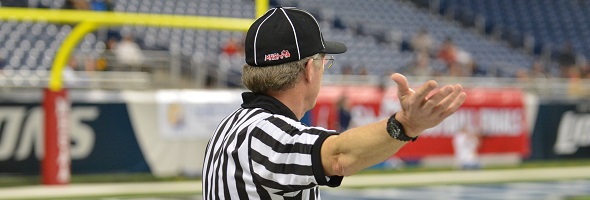
Be the Referee: Pass Interference
September 9, 2014
This week, MHSAA assistant director Mark Uyl explains one of the toughest calls to make on the football field.
"Be the Referee" is designed to help educate people on the rules of different sports, to help them better understand the art of officiating and to recruit officials. The segment can be heard on Mondays, Wednesdays and Fridays during the school year on The Drive With Jack Ebling on WVFN-AM, East Lansing.
Below is this week's segment - Pass Interference - Listen
Today we’re going to talk about one of the most difficult calls for any football official – pass interference. It’s important to know that whenever a forward pass is thrown beyond the line of scrimmage that both players – the offensive receiver as well as the defender – each have an equal right to make a play on the football.
Now, not all contact will automatically result in a pass interference foul. The official must judge if that early contact before the ball arrives has placed one of the two players at a distinct disadvantage. When that contact does create the disadvantage, you have a foul for pass interference. When the contact is minimal and is simply incidental, no foul has occurred.
Past editions
Aug. 25 - Targeting - Listen
Sept. 4 - Concussions - Listen

Be the Referee: Overtime Differences
November 1, 2018
This week, MHSAA officials coordinator Sam Davis explains how high school football overtime differs from extra play at the college level.
Be The Referee is a series of short messages designed to help educate people on the rules of different sports, to help them better understand the art of officiating, and to recruit officials.
Below is this week's segment – Overtime Differences - Listen
There are a few differences in high school football overtime compared to college games.
During overtime in high school football, each team begins its offensive series 1st-and-Goal from the 10- yard line as opposed to 1st–and-10 at the 25. The only way a team can pick up a first down is on a roughing foul – roughing the passer, the holder, the center or the kicker.
A lost fumble or intercepted pass ends a team’s offensive series, (and on) a try for an extra point following a touchdown, the defense cannot return the ball for a score. And unlike college football, there is never a requirement that a team go for a 2-point conversion. What is common between the two levels is that each team gets one timeout per overtime, and unused timeouts don’t carry over from regulation or from overtimes.
Past editions
October 25: Trickery & Communication - Listen
October 18: Punts & Missed Field Goals - Listen
October 11: What Officials Don't Do - Listen
October 4: Always 1st-and-Goal - Listen
September 27: Unique Kickoff Option - Listen
September 20: Uncatchable Pass - Listen
September 13: Soccer Rules Change - Listen
September 6: You Make the Call: Face Guarding - Listen
August 30: 40-Second Play Clock - Listen
August 23: Football Rules Changes - Listen

